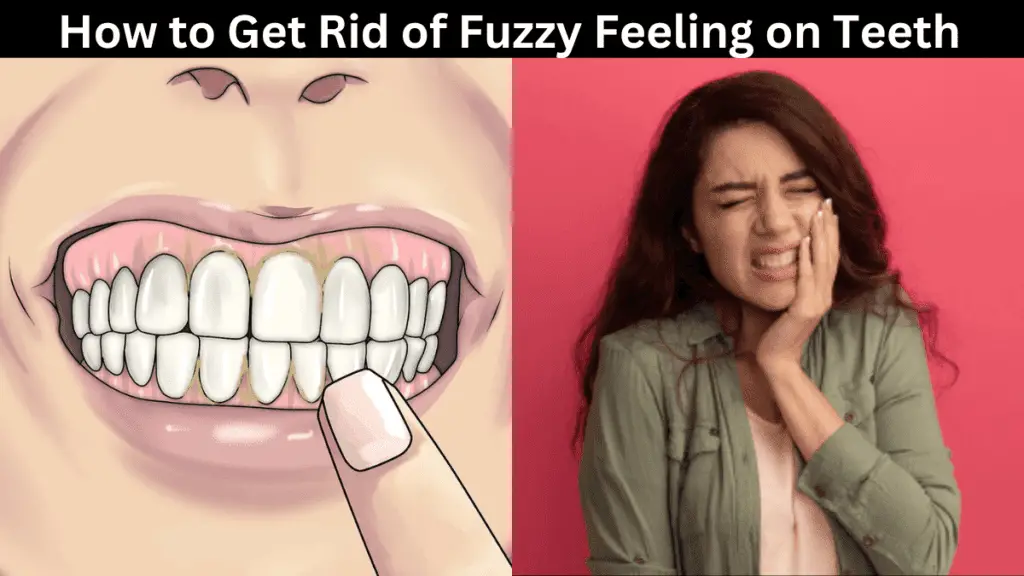Do you ever feel like your teeth are fuzzy, even after brushing? It’s a common problem and can be caused by a few different things. In this article, we’ll explore what causes fuzzy feeling on teeth and how to get rid of fuzzy feeling on teeth.
What Causes Fuzzy Feeling on Teeth?

The most common cause of fuzzy feeling on teeth is plaque buildup. Plaque is a sticky film that builds up on the surface of your teeth when bacteria in your mouth mix with food particles and saliva. This plaque can make your teeth feel rough and fuzzy.
Another cause of fuzzy feeling on teeth is oxalic acid. Oxalic acid is found in certain foods, such as leafy greens, nuts, berries, and chocolate. When these foods come into contact with your teeth, they can leave behind a sticky residue that can make your teeth feel fuzzy.
Finally, some people may experience a fuzzy feeling on their teeth due to poor oral hygiene habits. Not brushing or flossing regularly can lead to plaque buildup, which can make your teeth feel rough and fuzzy.
Read: What Does a Cavity Look Like? Signs, Causes, Prevention and Treatment
How to Get Rid of Fuzzy Feeling on Teeth

If you have a buildup of plaque or tartar on your teeth, the best way to get rid of it is to visit your dentist for a professional cleaning. Your dentist will use special tools to remove the plaque and tartar from your teeth. This will help reduce the fuzzy feeling on your teeth and make them smoother.
In addition to visiting your dentist for regular cleanings, there are also some things you can do at home to help reduce the amount of plaque buildup on your teeth:
- Brush twice per day with fluoride toothpaste – Brushing regularly helps remove plaque from your teeth before it has a chance to harden into tartar. Be sure to brush all surfaces of each tooth for two minutes each time you brush.
- Floss daily – Flossing helps remove plaque between your teeth where brushing may not reach. It’s important to floss at least once per day in order to keep your gums healthy and free from disease-causing bacteria.
- Use an antibacterial mouthwash – Mouthwash helps kill bacteria that cause bad breath as well as plaque buildup on your teeth. Look for an antibacterial mouthwash that contains fluoride for added protection against cavities and gum disease.
- Avoid sugary snacks – Sugary snacks provide fuel for the bacteria in our mouths which can lead to increased plaque formation over time. Try limiting sugary snacks between meals or opt for healthier alternatives such as fruits or vegetables instead.
Why Do My Teeth Feel Fuzzy Even After Brushing?
Even if you brush twice per day with fluoride toothpaste and floss regularly, there may still be times when you experience a fuzzy feeling on your teeth after brushing due to certain foods or drinks that contain acids that dissolve the enamel over time leading to cavities and tartar (which only dentists can remove).
Foods high in oxalic acids such as spinach, chard, kale, rhubarb, collards, and beetroot should be avoided if possible as they can contribute significantly towards tooth decay over time if consumed regularly without proper dental care habits being followed up afterward (such as brushing twice per day).
Additionally, acidic beverages such as soda or energy drinks should also be avoided due to their high sugar content which provides fuel for bacteria in our mouths leading again towards increased levels of plaque formation over time if consumed regularly without proper dental care habits being followed up afterward (such as brushing twice per day).
Smoking should also be avoided due to its negative effects on oral health including increased risk of gum disease due to its ability to increase levels of inflammation within our mouths leading again towards increased levels of plaque formation over time if smoked regularly without proper dental care habits being followed up afterward (such as brushing twice per day).
Finally, certain medications may also contribute towards dry mouth which increases the risk of cavity formation due its the ability to decrease saliva production within our mouths leading again towards increased levels of plaque formation over time if taken regularly without proper dental care habits being followed up afterward (such as brushing twice per day).
Read: Home Remedies For Denture Sores
Conclusion
The fuzzy feeling on teeth is often caused by excessive amounts of plaque buildup which can transform into tartar that only dentists can remove properly through professional cleanings every 6 months or so depending upon individual needs/situations/risks etc. Additionally, regular brushing with fluoride toothpaste combined with flossing daily along with avoiding sugary snacks & acidic beverages & smoking & certain medications will help reduce the risk of excessive amounts of plaque accumulation leading again towards reduced levels/risk towards cavity formation & gum disease, etc. All these measures combined together should help reduce any existing fuzzy feelings present upon one’s own individual set(s)of teeth whilst helping maintain good overall oral health going forward into the future too!
FAQ
Why do I feel texture on my teeth?
Texture on your teeth can be caused by plaque or tartar buildup, which can occur if you don’t practice proper dental hygiene.
Do healthy teeth feel smooth?
Healthy teeth should feel smooth and slick when you run your tongue over them, but sometimes they may feel fuzzy due to plaque buildup or other oral health issues.
What causes teeth to feel fuzzy?
Fuzzy teeth can be caused by improper brushing techniques, not flossing regularly, or consuming acidic foods and drinks that wear away the enamel of your teeth.











